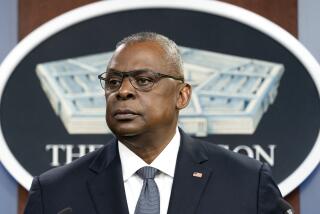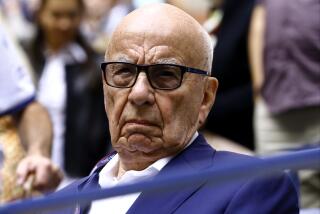With War Losing Support, Rumsfeld Stages a Retreat
WASHINGTON — Defense Secretary Donald H. Rumsfeld, once so popular as an administration spokesman for the Iraq war that President Bush dubbed him a “matinee idol,” has reduced his public profile, trimming appearances as the war has turned from a positive for the Bush campaign into a potential liability.
Critics, particularly on the left, have delighted in the shrinking Rumsfeld role.
Now, supporters have weighed in as well, but not with delight. “He’s our rock star,” one senior administration official said Wednesday on condition of anonymity. “He should be out there.”
The man who gave daily progress reports at the Pentagon in the heat of the war has appeared only twice at Pentagon briefings since May.
And the White House, which coordinates which administration officials appear on the networks’ news-making Sunday talk shows, has not lined up a Rumsfeld interview for months, although a senior administration official, speaking on condition of anonymity, denied that the White House did not want Rumsfeld speaking out.
The wisecracking defense chief has not disappeared entirely -- he still draws throngs for speeches and handshakes from tourists when he appears on Capitol Hill. Since May, he has appeared 13 times before groups of reporters and twice before Congress, as well as giving other television and radio interviews, a Pentagon tally shows.
Among 19 television and radio interviews Rumsfeld has done since May, many have been with local media or with supportive satellite and cable networks, which often give more favorable coverage than other national media.
“Well, you know, I’m one of your big fans,” Radio America reporter Blanquita Cullum told the secretary at the conclusion of a program last month. “I love you a lot.” In Nashville, WWTN radio interviewer Steve Gill ended his interview with Rumsfeld by saying, “Keep up the great work.”
But Rumsfeld has faded from the briefing rooms and network TV news sets where he earned his reputation as a colorful war advocate, and has dropped some of his speaking engagements. Following congressional calls for his resignation after the Abu Ghraib prison abuse scandal broke in early May, Rumsfeld dropped a scheduled appearance at the Philadelphia World Affairs Council, leaving his deputy, Paul D. Wolfowitz, to fill in.
Rumsfeld’s close identification with the Iraq war and the prison scandal has affected his job approval ratings in surveys.
He drew enviable approval ratings of 71% just after the Iraq war started and was still considered a good secretary of Defense by 58% of Americans last fall in a Gallup/CNN/USA Today poll. But his numbers continued to slide, and the last such survey, in May, showed 46% approving of his job performance.
“He’s not a rock star anymore,” a senior Republican aide on Capitol Hill said on condition of anonymity.
Pentagon officials rejected the assertion that the nation’s top defense official was lying low to duck criticism. They said the administration had sought to turn the focus of the world on Iraqi political leaders and on U.S. Ambassador John D. Negroponte since sovereignty was transferred to an interim Iraqi government on June 28.
“With the transition to sovereignty in Iraq and the establishment of the U.S. Embassy there, the Iraqi national leadership and the State Department leadership are communicating often with the public,” Pentagon spokesman Eric Ruff said. “The situation has shifted from what started out as primarily a Defense Department responsibility. We go out when we need to be out.”
Rumsfeld has kept up his visibility with foreign dignitaries, visiting Iraq and Afghanistan often and stopping each time along the way to pay his respects to allied leaders and addressing reporters in those nations.
But Iraq policy and media analysts attributed Rumsfeld’s lower domestic profile to a broader strategy by the Bush administration to shift the focus away from Iraq. So far, they say, it is working.
“Look at the front page -- Iraq is not there,” said Ivo Daalder, a scholar at the Brookings Institution who has written extensively on Iraq. “I think this is a deliberate strategy by the Bush administration: This is what [the transfer of sovereignty] was all about.”
Daalder said he believed the administration’s strategy was “working politically -- it is protecting the president, and that’s its purpose.”
“The essence of the administration’s strategy, starting back last November, was to have Iraq disappear from the American political scene so it would not be here, politically, by the time the election came around,” he said.
But Duncan Hunter (R-El Cajon), chairman of the House Armed Services Committee, said Rumsfeld was not being kept under wraps. He’s just busy.
“Don Rumsfeld’s just got a massively full plate here,” Hunter said in an interview Wednesday. “He’s not only running the operations in Afghanistan and Iraq, but he’s also in the middle of a fundamental reform of the Department of Defense.”
As if that weren’t enough, Hunter said, Rumsfeld now had “this huge challenge,” presented by the commission that investigated the Sept. 11 attacks, to take part in an overhaul of the intelligence community.
Danielle Pletka, a scholar at the American Enterprise Institute, a conservative think tank, scoffed at the notion that the administration had a strategy to keep Iraq out of the limelight during the election campaign.
“I don’t think there is a grand strategy of who should be out there and who shouldn’t be,” Pletka said. “I’m willing to bet that Don Rumsfeld is sick and tired of talking to reporters and has decided that his days on camera are behind him.”
Pletka said the 72-year-old Rumsfeld no longer was required to hold daily, nationally televised updates on the war:
“The purpose that brought him to the fore -- remember his stud muffin era? -- to discuss the issues that were facing us on a really daily basis, they are certainly not front and center anymore, and thank goodness.”
More to Read
Sign up for Essential California
The most important California stories and recommendations in your inbox every morning.
You may occasionally receive promotional content from the Los Angeles Times.










